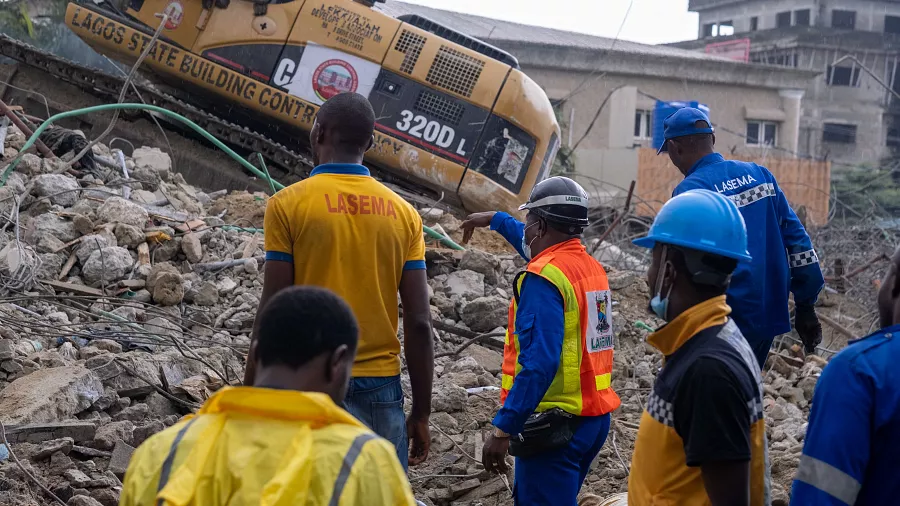Outline of the Article
- Introduction to Building Collapse Banana Island Lagos
- Importance of Safe Building Construction
- Overview of the Building Collapse Incident
- Factors Contributing to the Collapse
- Structural Issues
- Lack of Oversight and Regulation
- Poor Construction Practices
- Impacts of the Collapse
- Human Casualties
- Economic Consequences
- Response and Rescue Efforts
- Investigations and Accountability
- Lessons Learned
- Importance of Building Codes and Regulations
- Preventive Measures
- Future of Construction Safety in Lagos
- The Role of Technology in Building Safety
- Community Awareness and Involvement
- Collaborative Efforts with Government and NGOs
- Conclusion
Introduction to Building Collapse Banana Island Lagos
Building collapse banana island lagos Nigeria, is renowned for its luxurious real estate and upscale living. Developed by Hi-Tech Construction Ltd, this man-made island is one of the most affluent neighborhoods in Nigeria, boasting opulent residences, high-end amenities, and scenic waterfront views. However, recent events have cast a shadow over its reputation, highlighting the pressing issue of building safety.
Importance of Safe Building Construction
Safety in building construction is paramount to safeguarding human lives and preserving infrastructure integrity. Proper construction practices, adherence to building codes, and rigorous quality control measures are essential to prevent tragedies such as building collapses.
Overview of the Building Collapse Incident
In September 2023, Banana Island was struck by a devastating building collapse that claimed several lives and caused extensive damage to property. The incident sent shockwaves through the community and raised concerns about the safety standards of construction projects in the area.
Factors Contributing to the Collapse
- Structural Issues: Preliminary investigations revealed structural flaws and weaknesses in the collapsed building, including inadequate reinforcement and substandard materials.
- Lack of Oversight and Regulation: There was a lack of effective oversight and enforcement of building regulations, allowing for lax construction practices to go unchecked.
- Poor Construction Practices: Cut corners, such as the use of inferior materials and shortcuts in the construction process, compromised the structural integrity of the building.
Impacts of the Collapse
The building collapse banana island lagos had far-reaching consequences, including loss of life, injuries, displacement of residents, and significant economic repercussions. Families were left devastated, and the community mourned the tragic loss of loved ones.
Response and Rescue Efforts
Following the collapse, emergency response teams, including firefighters, paramedics, and volunteers, mobilized swiftly to search for survivors and provide medical assistance. The rescue operation was challenging due to the unstable conditions of the building debris.
Investigations and Accountability
Government agencies launched investigations to determine the causes of the collapse and hold accountable those responsible for negligence or wrongdoing. It was essential to uncover the truth and ensure justice for the victims and their families.
Lessons Learned
The tragedy served as a wake-up call, prompting stakeholders to reevaluate existing building practices and regulatory frameworks. It highlighted the need for greater vigilance, transparency, and accountability throughout the construction industry.
Importance of Building Codes and Regulations
Stringent building codes and regulations are vital to promoting safety and resilience in construction projects. Compliance with these standards helps mitigate risks and ensures that buildings are structurally sound and safe for occupancy.
Preventive Measures
To prevent future incidents, proactive measures must be implemented, including rigorous inspections, enforcement of building codes, and mandatory compliance with safety protocols. Building developers and contractors must prioritize safety at every stage of the construction process.
Future of Construction Safety in Lagos
There is a pressing need to enhance construction safety practices in Lagos and across Nigeria. This involves strengthening regulatory frameworks, investing in training and capacity building, and fostering a culture of safety consciousness within the construction industry.
The Role of Technology in Building Safety
Technological innovations, such as Building Information Modeling (BIM), advanced materials, and real-time monitoring systems, offer promising solutions for enhancing building safety and performance. Embracing these technologies can improve project outcomes and reduce the risk of accidents.
Community Awareness and Involvement
Community engagement plays a crucial role in promoting building safety. Educating residents about the importance of adhering to safety standards and reporting any concerns or violations can help prevent tragedies and foster a sense of collective responsibility.
Collaborative Efforts with Government and NGOs
Collaboration between government agencies, non-governmental organizations (NGOs), industry stakeholders, and community groups is essential for addressing systemic challenges and implementing effective solutions. By working together, we can build safer, more resilient communities.
Conclusion
The building collapse banana island lagos, serves as a sobering reminder of the importance of prioritizing safety in construction projects. It underscores the need for robust regulatory oversight, adherence to building codes, and proactive risk management practices. By learning from this tragedy and taking decisive action, we can strive to prevent similar incidents in the future and ensure that every building is a safe haven for its occupants.
5 Unique FAQs
- Q: Could the building collapse in Banana Island have been prevented? A: Yes, with proper oversight, adherence to building codes, and quality control measures, the collapse could have been prevented.
- Q: What steps are being taken to improve building safety in Lagos? A: Efforts are underway to strengthen regulatory frameworks, enhance inspection protocols, and raise awareness about the importance of building safety.
- Q: Are there legal consequences for those responsible for building collapses? A: Yes, individuals or entities found responsible for negligence or violations of building regulations may face legal consequences, including fines and imprisonment.
- Q: How can residents contribute to building safety in their communities? A: Residents can report any safety concerns or violations to the appropriate authorities and advocate for stronger enforcement of building codes.
- Q: What role can technology play in preventing building collapses? A: Technology, such as BIM and real-time monitoring systems, can help identify structural issues early on, improving overall safety and reliability.

